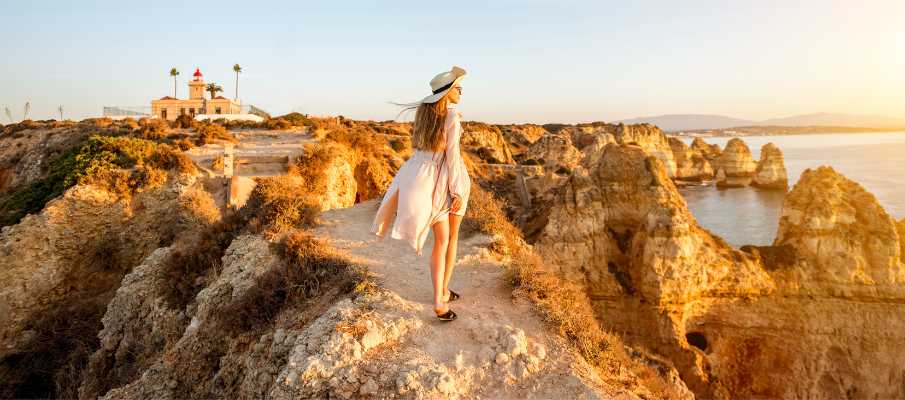The Algarve is often celebrated for its stunning coastline and sunny beaches, but this picturesque region in southern Portugal also boasts a rich cultural heritage and fascinating history. From Moorish influences and Roman ruins to charming towns with vibrant festivals, the Algarve is a paradise for those interested in exploring a destination with deep-rooted traditions and cultural experiences. This guide will uncover the best places to visit and activities to experience for history and culture enthusiasts in the Algarve.
1. A Glimpse into Algarve’s History
To appreciate the Algarve’s cultural depth, it’s important to understand its history. The region’s name originates from “Al-Gharb,” meaning “the west” in Arabic, a nod to its past under Moorish rule from the 8th to 13th centuries. Before that, the Romans settled in the area, contributing to its architectural and cultural landscape. This diverse historical background has shaped the Algarve’s cultural identity, influencing its architecture, cuisine, and traditions.
- Moorish Influence: The Moors left a lasting impact on the Algarve’s architecture, seen in the whitewashed houses, narrow cobbled streets, and decorative tiles (azulejos).
- Roman Roots: The remnants of Roman settlements across the region showcase the Algarve’s ancient past, with ruins, bridges, and mosaics telling the story of a once-thriving empire.
2. Historical Towns to Explore
The Algarve is dotted with historical towns, each with its unique character and charm. Here are some must-visit towns for those keen on diving deep into the local history.
- Silves: Once the Moorish capital of the Algarve, Silves is a town that echoes with history. Its iconic Silves Castle offers panoramic views of the surrounding area and boasts well-preserved Moorish architecture. The town’s Cathedral of Silves, built on the site of a former mosque, is another important site showcasing the blend of Christian and Moorish influences.
- Tavira: Known as one of the most beautiful towns in the Algarve, Tavira is often referred to as an “open-air museum.” Wander through its charming streets, over the Roman Bridge, and explore its 37 churches, including the Church of Santa Maria do Castelo. Don’t miss the Tavira Castle ruins, which offer stunning views over the town and the Gilão River.
- Lagos: A lively coastal town with a deep maritime history, Lagos was once the centre of Portugal’s Age of Discoveries. Visit the Forte da Ponta da Bandeira, a 17th-century fortress that guarded the entrance to the harbour, and explore Museu Municipal Dr. José Formosinho for an insight into Lagos’ religious, archaeological, and maritime history.
3. Museums and Cultural Sites
For history lovers, the Algarve is filled with museums and sites that offer insights into its rich past.
- Museu de Portimão: Housed in a former fish-canning factory, this museum provides an in-depth look into the region’s industrial history, particularly its connection to the fishing industry. Through interactive displays and artefacts, visitors can learn about the lives of local fishermen and factory workers.
- Archaeological Museum of Albufeira: Located in Albufeira, this museum contains artefacts from the prehistoric, Roman, and Moorish periods, offering a snapshot of the Algarve’s extensive history. The museum is housed in a former town hall building, adding to its historical significance.
- Milreu Roman Ruins: For those interested in ancient history, the Milreu Roman Ruins, near Faro, are a must-see. These well-preserved ruins include a villa, bath complex, and mosaics, providing a glimpse into life during the Roman Empire. The site is one of the most significant Roman remnants in the region.
4. Festivals and Traditions
One of the best ways to immerse yourself in the Algarve’s culture is to take part in local festivals and events, where music, dance, and traditions are celebrated.
- Festa da Ria Formosa (Faro): This festival, dedicated to the Ria Formosa Lagoon, highlights the local traditions, cuisine, and music. It is a great opportunity to try local seafood dishes, watch traditional dances, and experience Algarvian culture.
- Carnival Celebrations: The Algarve’s vibrant carnival season is not to be missed, particularly in towns like Loulé. Colourful parades, costumes, and music fill the streets, reflecting a blend of Portuguese traditions and influences from Brazil’s famous carnival.
- Folk Dance and Music: Fado music is an integral part of Portuguese culture, and the Algarve is no exception. Many towns host fado nights, where you can enjoy the soulful music and experience an authentic slice of Portuguese tradition.
5. Architecture and Landmarks
The architecture of the Algarve is a testament to its diverse cultural heritage, from Moorish influences to Renaissance structures.
- Church of São Lourenço (Almancil): A true gem of the Algarve, this 18th-century church is famed for its stunning blue-and-white azulejos that depict the life of Saint Lawrence. The interior is a visual masterpiece, with tiles covering the walls and ceilings.
- Palácio de Estoi (Estoi): This beautiful 19th-century palace and its gardens are a perfect example of romantic Portuguese architecture. The palace, located near Faro, is now a pousada (a historic hotel), but its grounds and chapel are open to visitors.
- Fortresses and Castles: Fortresses dot the Algarve’s coastline, once built to protect against pirate attacks. Notable examples include the Fort of Santa Catarina in Portimão and the Castle of Aljezur. These structures offer not just a glimpse into the region’s military history but also provide stunning views of the coast and countryside.
6. Gastronomy: A Cultural Experience
The Algarve’s cuisine is deeply connected to its cultural heritage. Traditional dishes reflect the region’s Moorish and maritime influences.
- Seafood and Fish Dishes: Being a coastal region, the Algarve is renowned for its seafood. Dishes like cataplana de marisco (a seafood stew cooked in a copper pot) and sardinhas assadas (grilled sardines) are local favourites.
- Algarvian Sweets: Moorish influence is especially evident in the Algarve’s sweets, with ingredients like almonds, figs, and oranges featuring prominently. Try Dom Rodrigo or Morgadinhos, which are traditional Algarvian treats that offer a taste of the region’s unique flavours.
7. Natural Beauty with Historical Context
The Algarve’s natural beauty also has cultural and historical significance. Several sites blend nature with history, offering a holistic travel experience.
- Ria Formosa Natural Park: This stunning coastal lagoon is not only a biodiversity hotspot but also has historical relevance as a site of salt production and fishing. Visitors can take boat tours to learn about the lagoon’s ecology and its importance to local communities.
- Sagres and Cape St. Vincent: Once considered the “End of the World,” Sagres was a key point during the Age of Discoveries. The Sagres Fortress offers breathtaking views over the Atlantic and provides a historical context for Portugal’s maritime exploration.
8. Day Trips and Excursions
There are plenty of opportunities to venture beyond the main towns and delve into lesser-known historical and cultural experiences.
- Alcoutim: Located on the banks of the Guadiana River, this quaint village offers a slower pace of life and a chance to see traditional Algarve. The Castle of Alcoutim provides views over the river and into Spain.
- Cork and Olive Oil Tours: The Algarve’s countryside is dotted with cork oak forests and olive groves. Take a guided tour to learn about the traditional processes of cork extraction and olive oil production, both of which have deep historical roots in the region.
Conclusion: A Rich Cultural Journey Awaits
For lovers of history and culture, the Algarve offers a wealth of experiences that go far beyond its beaches. From historical towns and ancient ruins to traditional festivals and local gastronomy, this region invites visitors to explore its rich heritage and diverse cultural landscape. Whether you’re wandering through centuries-old castles, listening to fado music in a cosy tavern, or savouring a traditional Algarvian dish, the Algarve promises an unforgettable cultural adventure.
Discover the Algarve with Perfect Travel Transfers
Exploring the historical and cultural wonders of the Algarve is even more enjoyable when you can travel comfortably and stress-free. Perfect Travel offers reliable and convenient transfer services tailored to your needs, whether you’re heading to the region’s beautiful historic towns, cultural sites, or local events. With friendly drivers and a commitment to customer satisfaction, Perfect Travel ensures that you can fully immerse yourself in the Algarve’s rich heritage. Book your transfer with Perfect Travel and experience the Algarve in style and comfort.




